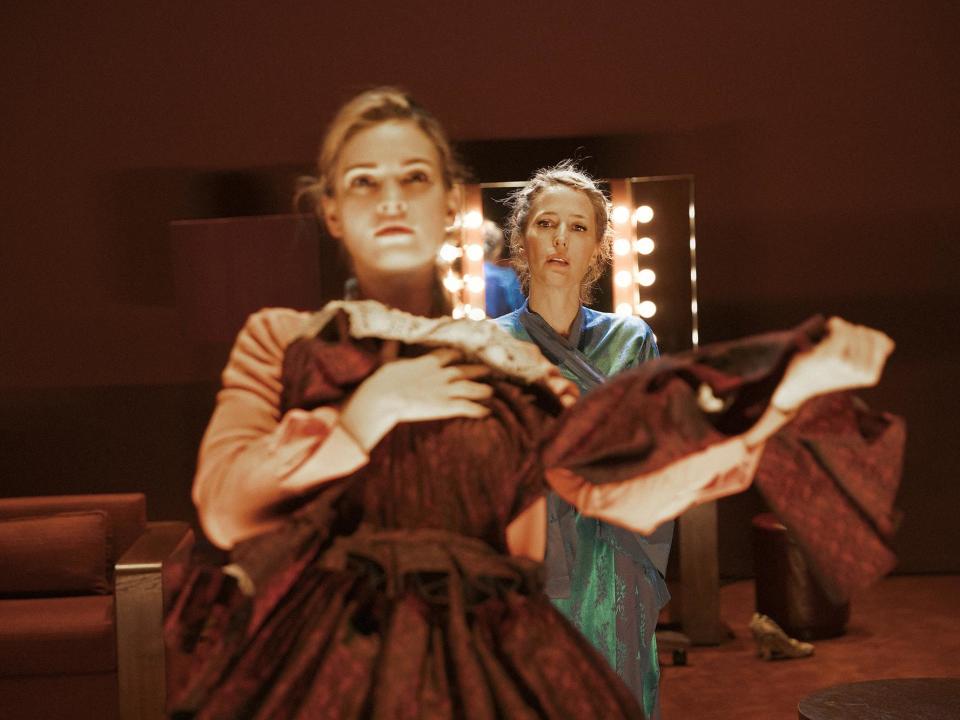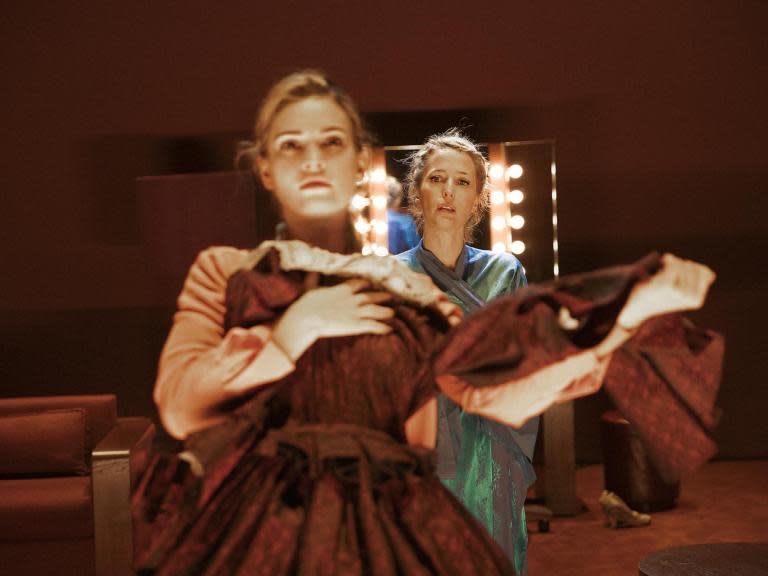All About Eve, Noel Coward Theatre, review: Gillian Anderson is arresting in emphatically successful update of classic film
All About Eve is one of the most delectably bitchy and cynical backstage movies ever made about the American theatre. So Joseph Mankiewicz’s 1950 masterpiece was always destined to find a natural home on the boards. And Belgian maestro, Ivo van Hove, is, in some respects, the ideal candidate for the job of directing and adapting. In addition to his roster of triumphs with straight plays (A View from the Bridge, Shakespeare’s Roman and English history cycles etc), he’s shown a decided penchant for creating theatrical versions of notable movies – a whole brood of Bergmans, for example, and (most recently) Luchino Visconti’s Obsession (with Jude Law) and Paddy Chayefsky’s Network (with Bryan Cranston).
These good omens do not deceive, Van Hove’s adaptation of All About Eve is emphatically a success, albeit a qualified one. A coruscating sense of humour has never been a salient feature of this director’s work. You feel that the wisecracking fun in Mankiewicz’s knowing take on the “theat-uh” interests him less than the dark psychodrama that he compellingly draws out of. Usurpation here is the name of the game. This is the unnerving fable of the understudy who turns out to be your nemesis – the fear that the doting younger fan will end up surpassing you. It’s about ageism in the theatre and the limits society imposes on a woman’s professional aspirations. Highly pertinent, then.
Gillian Anderson courageously takes on the Bette Davis part of Broadway diva Margo Channing. Mankiewicz told Davis that “Margo is the kind of dame who would treat her mink coat like a poncho” and, indeed, you sense a sort of safety net of screw-you resilence at the bottom of her volatile outbursts. Anderson’s arresting performance shows you the desperate insecurity behind these flights of temperament. Characteristically, there’s live camerawork that allows us to see into offstage rooms. We gawp at blown-up footage, during the famous party-scene, of Margo’s drunken ignominy in the bathroom – wrenching down the shower curtain as she flails to get upright, head down the loo in a splattering of vomit.
Anderson manages to combine this with irresistible allure in her slinky gowns and drop-dead wit. There’s more than a frisson of the fan as fetishist in Lily James’s strong portrayal of Eve Harrington, the young admirer who hangs about the stage door each night and insinuates her way into the star’s circle, becoming her punishingly helpful assistant, understudy and rival. It’s often said that Anne Baxter, who played the part in the film, is too transparently scheming in her very “managed” breathy seductiveness. James’s Eve is comparatively spontaneous; there are moments where you reckon her plot could go awry.
There are some very Bergmanesque sequences in van Hove’s version. Anderson’s Margo stares searchingly in her dressing room mirror and scrunches up the flesh of her face as if re-modelling putty. In close up, she watches it time-lapse into old age. She cries out as if stabbed. Later, as Eve takes off her make-up in the same mirror, after her triumphant understudy performance, it’s as though there’s interference in the reception of the filmed image and Eve sees blizzarding premonitions of Margo. This struck me as ironically more like Persona and its eerie merging of two personalities than anything in van Hove’s below-par staging a few years ago of that Bergman classic.
When is all this happening? Not the 1950s as in the film. I had just made my mind up that that it was the late 1960s or early 1970s (mini-dresses, tin-foil helium balloons) when someone walked on with a laptop. Jan Versweyveld’s design is typically striking. The lilac walls intermittently rise to reveal a backstage full of celebrity photography and upmarket-dowdy furniture for the scenes. The latter are played on a big stripped-back ochre space on the other side. The effect is abstract. I found the update confusing, however. It’s not just that people still jokily refer to Hollywood as if it were an upstart medium or that the theatre seems to be stuck in Elia Kazan time-warp where a heroine would be naked without her crinoline. It’s terribly poignant that even Eve has been indoctrinated by the culture to believe that a woman can only be a woman when she gives up playing roles that are too young for her and takes on the real profession of being a wife. And tragic that it never even occurs to her that she should be demanding parts for characters her age. Maybe the disjointed context is meant to be deliberately disorienting and to bring these matters home more sharply, but I remained puzzled.
The supporting cast are a bit hit-and-miss. No actor could hope to emulate the satanic suavity of George Sanders, purring his poisonous quips as the deadly theatre critic Addison DeWitt. Stanley Townsend (a performer in a different mould) is good here but he’s been oddly directed. One of the things that marks Addison out as lethal is that he never really loses control. He does here, though, in an overly melodramatic show-down with Eve, his “soulmate”.
By contrast, the role of Birdie, Margo’s old dresser, has been a tad sentimentalised. Nothing gets past this character. She’s the only one of them to see through Eve: “What a story! Everything but the bloodhounds snapping at her rear end.” It’s hard for Sheila Reid to communicate the sour pop of wisecracks like that (Birdie is mistress of the snide aside) if the production takes it as read that she’s a lovely old things really. Best of the bunch is Monica Dolan who gives a glorious performance as Margo’s best friend Karen. Much more than the sweet housewife in the film, this Karen is ballsy, fun, highly intelligent, conflicted, devoted. She and Anderson beautifully suggest that they go back a long way.
Some of the live film stuff is very funny (seeing how people crowd into kitchens at parties) but it can steal the focus from the principal action. It’s peculiar that because of this, the film’s most celebrated line, “Fasten your seatbelts – it’s going to be a bumpy night”, doesn’t have the impact that it should. An impressive occasion, nonetheless, and very thought-provoking. For reasons that relate to the nature of the story rather than with the nature of Ms Anderson, it must be a ticklish business being her understudy in this venture.
To 11 May 2019 (delfontmakintosh.co.uk)



